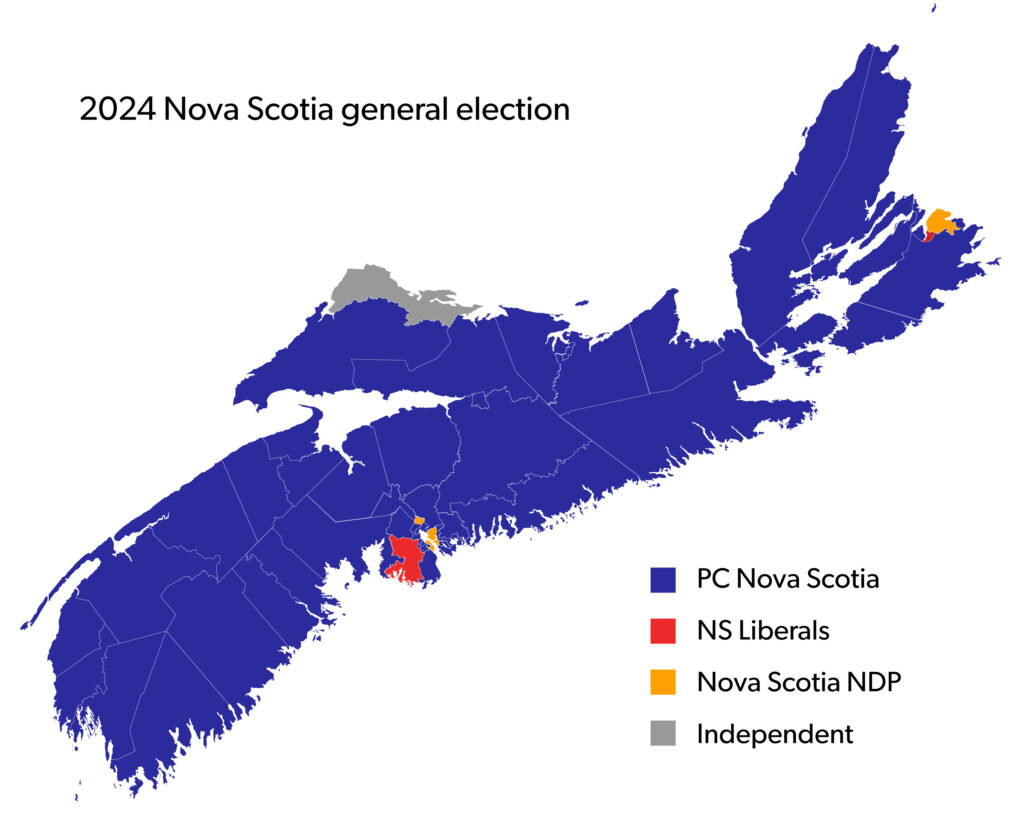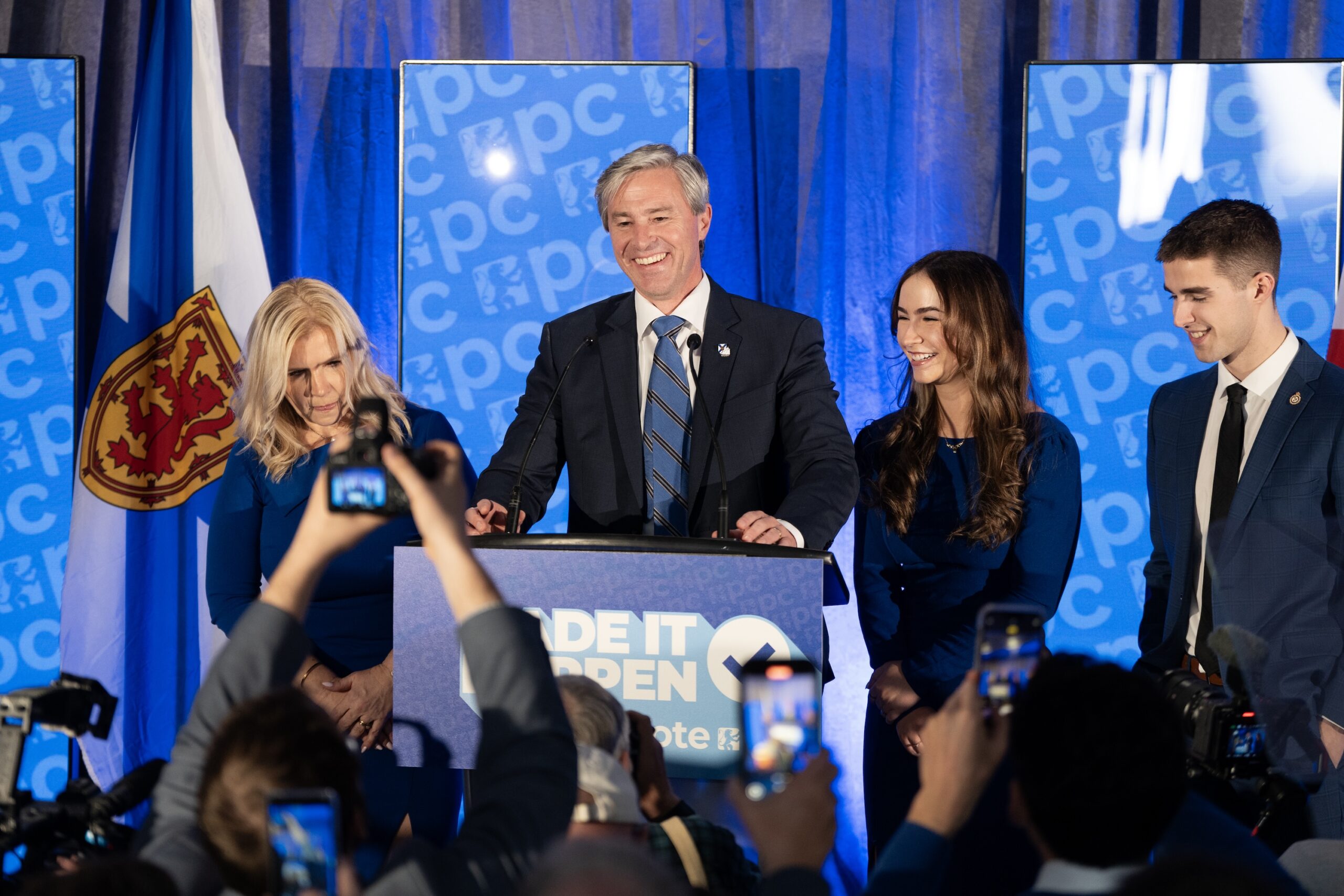Tim Houston’s Progressive Conservative government was re-elected with a landslide record majority, winning 43 of the Nova Scotia legislature’s 55 seats, more than any other PC government in the province’s history. Yesterday’s result is the largest majority of seats as a percentage of the total legislature since PC John Buchanan’s win forty years ago in 1984. No party has won a larger percentage of the popular vote (52.8%) since Robert Stanfield’s victory in the 1963 provincial election.
The Liberal Party of Nova Scotia, led by Zach Churchill sustained one of the worst losses in the history of the party since confederation. Winning just two seats, the Liberals have not won so few seats in the legislature since Confederation and also received their smallest ever percentage of the overall popular vote (22.9%). Churchill himself was defeated in the district of Yarmouth by PC candidate Nick Hilton.
With just 22.3% of the popular vote but distributed more efficiently, Claudia Chender’s NDP won 9 seats and will form the Official opposition. The NDP picked up additional seats held by the Liberals and PCs in the greater Halifax Regional Municipality (HRM) area – including Sackville Cobequid, Halifax Armdale, and Fairview – Clayton Park.
Cumberland North MLA Elizabeth Smith-McCrossin won her seat again as an independent. Smith-McCrossin sat as an independent after she was barred from running again as PC candidate due to her involvement in a roadblock protest on the Trans Canada Highway in 2021. The N.S. Green Party ran only 23 candidates and received less than 1 per cent of the overall popular vote.
Campaign 2024: A very Nova Scotian clash of brands and styles
The Houston PC government now commands a supermajority of seats in the Nova Scotia legislature. With a supermajority, the government could in theory change the rules of the legislative assembly unilaterally without the support of the two opposition parties. It remains to be seen whether any changes of this type will actually happen. The 2024 provincial election campaign mostly reflected the more civil political culture of the province as compared to the state of play between federal parties or provincial parties elsewhere in the country.
In terms of issues – Houston was successfully able to shape the ballot question to suit his pursuit of a stronger mandate – both to continue the PC government’s work on healthcare and also to pursue new policies on affordability and take strong intergovernmental stands on the carbon tax and the Chignecto Isthmus. The NDP gained ground with a concentration on areas where they most had room to grow – such as the Halifax Regional Municipality (HRM) – and by offering more ambitious commitments on healthcare and affordability appealing to experiences and expectations in those neighbourhoods.
In the debate but also in campaign tactics and choices, Churchill and the Liberals were frequently easily cast as the party of complaints/complaining. Their airtime was somewhat divided between advancing a large platform, filing complaints about alleged missteps of PC candidates, and sparring over the forensics of what had been achieved by Tim Houston’s PCs in the last three years. While the NDP’s Claudia Chender also did some of the latter, she was able to convey a positive brand and did not face as much drag from her federal leader as did Churchill – who had difficulty escaping the dark shadow of unpopularity presently hanging over the federal Liberals.
There’s no doubt Houston’s platform and statements telegraphed a moderate approach on increasing housing supply, providing some tax relief, and continuing with further improvements to healthcare services. Houston also opted to do more doorstep campaigning than normally expected in a leader’s tour. Aside from some criticism of the cost of some promises (ie. Harbour Bridge toll removal) from the Liberals, there was very little discussion of fiscal policy. The re-elected Premier enjoys a high level of public trust.

What’s next?
Tim Houston’s PC government
Mandates and platforms aside, Canada faces a serious challenge with President Trump’s statement that he will be placing 25% tariffs on Mexico and Canada once he takes office. Provincial and territorial premiers will be in contact with the Prime Minister jointly but also individually in the coming days and weeks. There will be some form of “Team Canada,” however that doesn’t mean a stand down on all fed-prov issues, especially since some of them are viewed by provincial governments as part of what needs to be addressed given the economic pressures.
There may be even more reason to push on tax relief – especially federally on the scheduled-to-increase carbon tax. The promised HST and business tax cuts will likely feature in the spring provincial budget. More complicated promises related to power rate caps, rent control and personal income tax reforms may have to straddle multiple budgets.
Progress continues on tech solutions to ensure “more faster” in healthcare. It was a point of difference between the PCs and NDP throughout the campaign. At no point did Houston shy away from pointing out app-related success stories or the rate of download of the app by Nova Scotia patients.
Houston has one of the largest PC caucuses ever, and all members fo his cabinet were re-elected. This creates obvious challenges in picking a cabinet and managing the size of the cabinet as well as those who don’t make the initial cut. Expect some new blood from the newly elected set of MLAs. The new cabinet could include Leah Martin – the new MLA for Cole Harbour and the first Indigenous MLA in Nova Scotia’s history. Martin had worked previously as an advisor in the Houston Government. Newly elected Kings South MLA Julie Vanexan has also been mentioned by reporters and pundits due to her extensive business background.
Appointment of the new cabinet may take a week or two. A throne speech will follow and with it, clarity on which planks of a fairly extensive and expensive platform will roll out first.
The Nova Scotia Liberals
The Liberals have suffered one of their worst defeats ever. In his concession speech and post result interviews, Zach Churchill made a point of accepting responsibility as leader for the party’s fortunes, even if there were also other exacerbating factors.
In order to retain official party status in the Nova Scotia legislature, the Liberals needed to run candidates in at least 75% of the districts in the province, win at least 10% of the overall popular vote and win at least 2 of the 55 seats in the legislature. By the thinnest of margins, they have managed to meet this threshold; they ran a full slate, won 22.9% of the overall popular vote and won the minimum 2 seats in the legislature.
While Churchill did not wish to resign as leader while the results in his Yarmouth district were still coming-in, it would be unlikely that his party would stand for him keeping the leader’s seat, except possibly in some interim capacity. In the tiny Liberal caucus, one of the surviving MLAs is ex-leader/premier Iain Rankin. This may further complicate what happens in the coming months.
The provincial Liberal Party enters a rebuilding period. This rebuilding as well as any near to medium term leadership race may be affected in part by what happens in the next federal general election – expected in the new year. There may be MPs who either choose not to run or who are defeated who may choose to pick up the provincial torch.
Claudia Chender and the NDP
It was a night to celebrate small but significant electoral successes. Official opposition parties enjoy more resources and opportunities in the legislature and its committees. Even on election night, Chender was testing messaging on the PC supermajority – foreshadowing that Houston may wish to further reduce the voice of the opposition.
With the new gains, the NDP has the ability to start thinking about their next beachhead districts and/or regions. Unlike the provincial Liberals, the NDP did at least come almost within striking distance of the PCs in public polls since 2021 on a few occasions, though not often. In this week’s election, the party also increased the number of districts in which they placed 2nd.
In many respects Chender outperformed and likely outpolled her party. She was clearly the challenger to Houston in the sole debate of the campaign. But for the loss of a candidate due to controversial comments about Israel, momentum for the NDP may have started sooner and accelerated more.
For more insights on the Nova Scotia election, connect with Senior Consultant Liam O’Brien.
